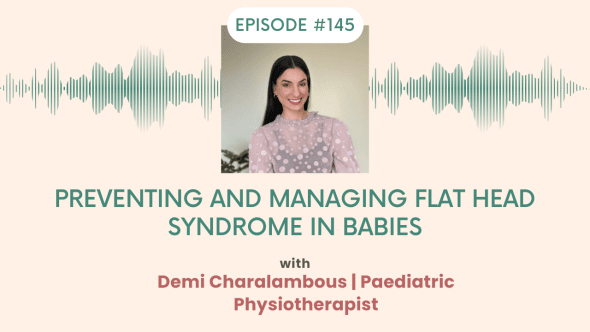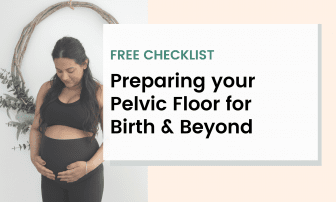In this episode we delve into the world of flat head syndrome and the crucial role of tummy time with our incredible guest, Demi, an experienced Paediatric Physiotherapist! 🧡
As an expectant or new parent, your baby’s health and well-being are of utmost importance to you.
That’s why we want to share some valuable insights on preventing and managing flat head syndrome, a common condition that can affect infants.
In this podcast episode, I had the opportunity to chat to Demi, a Paediatric Physio, who provided expert advice on this topic.
Flat head syndrome, characterized by a flat spot on a baby’s soft head, can occur when babies spend extended periods on one side, leading to a flattening of the affected area.
It may be influenced by factors such as a positional preference from the womb or neck tightness known as torticollis.
While flat head syndrome doesn’t have long-term effects on brain development, addressing the underlying cause is crucial for preventing future issues.
Here are some tips to help prevent and manage flat head syndrome:
Importance of Tummy Time to help prevent flat head
Encourage regular tummy time sessions from an early age. This will help strengthen your baby’s neck, back, and shoulder muscles, preventing flat spots and promoting healthy head rounding. Tummy time is also beneficial in preparing babies for rolling.
Diverse Positions to help reduce flat head syndrome
Changing your baby’s position frequently promotes a rounded head shape.
Minimizing Prolonged Pressure to support healthy development
Avoid using containers like bouncers, car seats, and swings that put prolonged pressure on specific areas of the head. Instead, provide opportunities for unrestricted movement and change positions frequently.
Repositioning Techniques and Sleeping Positions for managing flat head syndrome
Consider varying your baby’s sleeping position. For example, moving the cot to a different position in the bedroom can help promote a variety of head/neck positions.
Seeking Professional Help for flat head syndrome
If your efforts to reposition your baby and encourage tummy time do not improve the condition, or if you notice signs of neck tightness or poor tolerance of tummy time, it is advisable to consult a paediatric physiotherapist. They can assess your baby’s condition, provide expert guidance, and recommend appropriate exercises or interventions.
Monitoring your Baby’s Development
Regularly observe your baby’s development for any signs of floppiness, stiffness, or uneven use of one side of the body. If you notice any concerns, it’s important to seek further assessment from your healthcare provider.
Accessing Paediatric Physiotherapy for flat head syndrome
In Australia, you can see a paediatric physiotherapist privately without a referral. However, obtaining a referral from a general practitioner (GP) may entitle you to certain subsidised sessions.
Helmet therapy for flat head syndrome
Remember that in more severe cases, helmet therapy may be considered if repositioning, exercises, and strengthening techniques are not sufficient to correct the head shape. However, the decision to use a helmet depends on the severity of the flat spot and your concerns as a parent.
In conclusion, by incorporating tummy time, diverse positions, and minimising prolonged pressure, you can significantly reduce the risk of flat spots in your baby’s head. Trust your parental instincts and don’t hesitate to seek professional help when needed. And most importantly, prioritise bonding with your baby and enjoy their company throughout this journey.
Episode Links
Preparing for birth Pelvic health checklist
Free 7 Day Trial Pregnancy Workouts
Free 7 Day Trial Postnatal Workouts
Instagram @fitnestmama
Demi’s website: https://www.thebabyphysio.com/
Demi’s Instagram: @demi_thebabyphysio
DISCLAIMER:
All information is general in nature and doesn’t substitute individualised assessment, treatment and diagnosis. If you have any questions or concerns please consult your healthcare provider.





